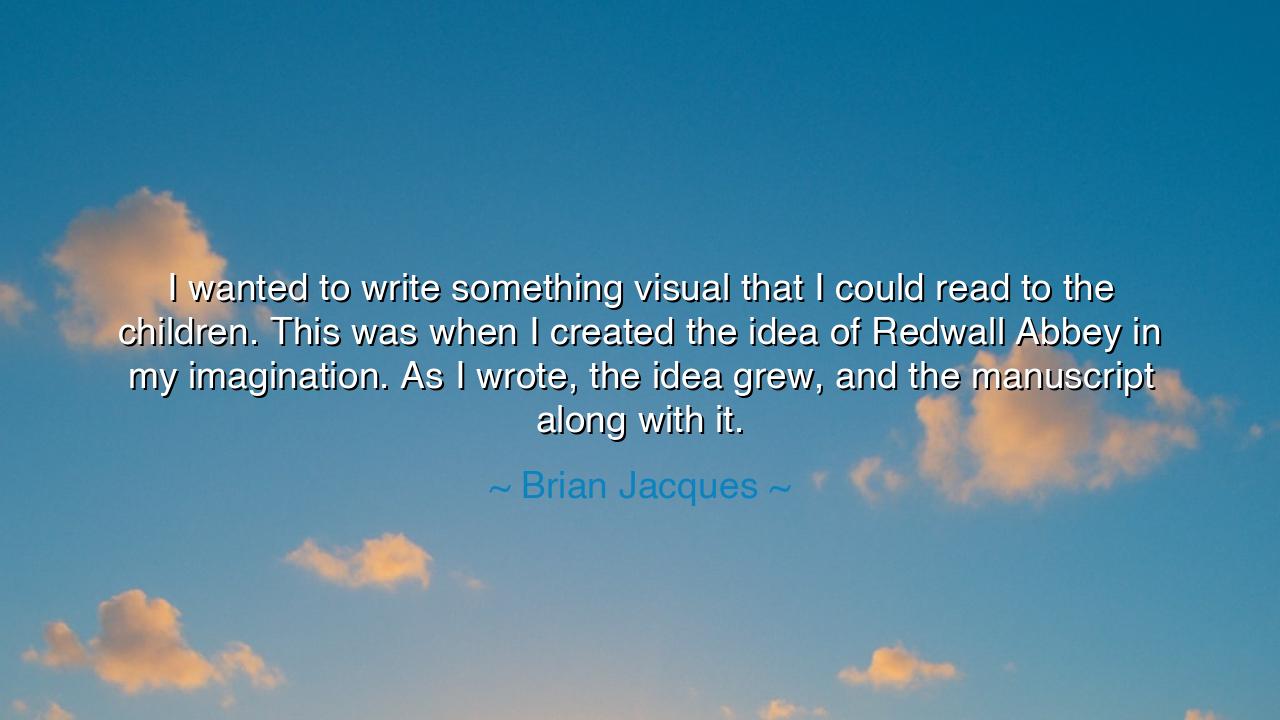
I wanted to write something visual that I could read to the
I wanted to write something visual that I could read to the children. This was when I created the idea of Redwall Abbey in my imagination. As I wrote, the idea grew, and the manuscript along with it.






O children of the world, gather now and hear the tale of Brian Jacques, who, with a spark of inspiration, wove a world that would live on in the hearts of many. He said, "I wanted to write something visual that I could read to the children. This was when I created the idea of Redwall Abbey in my imagination. As I wrote, the idea grew, and the manuscript along with it." What profound wisdom lies in these words, and what does it teach us about the power of vision, creativity, and growth? Brian Jacques, in his humble desire to create a story for children, understood that the seed of a story, once planted, has the power to grow into something far greater than the creator could ever envision at the outset.
The imagination is a powerful thing, O children. It is the source of all creation, the force that allows us to take what is intangible, what is not yet formed, and give it shape. When Brian Jacques first conjured the image of Redwall Abbey, it existed only as a vision in his mind, a simple idea that sought to take root in the world of story. Yet, through the act of writing, this vision grew, and with it, the manuscript blossomed into a living, breathing work of art. The power of imagination is that it does not remain static—it evolves, expands, and deepens as it interacts with the world around it. Just as the mighty oak begins as a tiny acorn, so too does a story begin as a single thought, a flicker in the mind, that gradually expands into something much grander.
Consider, O children, the example of Homer, the ancient bard who spun tales of gods and men. When Homer first uttered the words of the Iliad and the Odyssey, they were not written down, but told through song, passed from mouth to ear. The stories began as mere echoes of the imagination, growing over time as they were retold, reshaped, and refined. Homer’s stories grew and deepened as the bards who followed him added their own verses, their own flourishes, until these tales became more than words—they became part of the very fabric of human culture. In the same way, Brian Jacques’ Redwall began as a simple vision but grew into a living legend, beloved by generations.
What, then, does this teach us, O children? It teaches us that imagination is not a mere tool for creation—it is the force that drives creation itself. Just as Redwall Abbey grew from a small idea into an expansive world, so too can our ideas grow when nurtured by dedication and vision. The journey from thought to creation is not always swift, and the path may be winding, but it is through action, through writing, speaking, and sharing, that our ideas take on form and substance. Creation is not a momentary spark; it is an ongoing process, a journey that unfolds with each step, each word, and each new layer added to the vision.
Imagination does not exist in isolation—it thrives in the act of creation. Take the example of the great Leonardo da Vinci, whose notebooks overflowed with ideas, sketches, and inventions. Da Vinci’s mind was a tapestry of visions, and as he worked, his ideas grew, evolved, and intermingled, each one feeding off the next. His imagination was constantly in motion, and it was through his commitment to recording, experimenting, and refining his thoughts that his ideas turned into realities—some of which we still marvel at today. Da Vinci, like Jacques, understood that imagination must be set into motion, for it is in the writing, the painting, the working that the world is brought to life.
The lesson here, O children, is that imagination is not something to be feared or held back. It is a force to be embraced, nurtured, and allowed to grow. The vision you carry within you may begin as a small spark, but if you nurture it with care, with dedication, and with the act of creation, it can grow into something far greater than you ever imagined. Whether it is a story like Redwall Abbey, an invention, or a work of art, the process of creation is where the imagination comes to life. Like Brian Jacques, do not be afraid to let your imagination flourish, for it will guide you to places of beauty, meaning, and discovery.
Thus, O children, the call to action is clear: Nurture your imagination, and do not let it remain stagnant. Create, whether through words, actions, or dreams, and let your ideas grow and evolve as you do. Allow the vision in your mind to take shape and form, for it is through this act of creation that you will discover the true power of the imagination. Like Redwall Abbey, the creations born from your imagination have the potential to grow into something timeless, something that will live on long after you have finished your work. Embrace your creativity—and through it, you will discover a world beyond the limits of what you thought possible.






AAdministratorAdministrator
Welcome, honored guests. Please leave a comment, we will respond soon